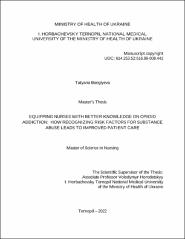| dc.description.abstract | Opioid abuse and addiction has become a rampant epidemic in the United States, and the entire world within the last few decades. This healthcare crisis is particularly contemptible due to the inadvertent involvement of healthcare providers in its perpetuation. Although the crisis was initiated as a result of misinformation spread by pharmaceutical companies, the medical community is now responsible for treating and preventing opioid abuse. Nurses in particular, participate in direct patient care. They are most often best equipped to determine a patient’s pain and provide pharmacological relief. Thus, it is vital that nurses are strongly educated on the ways in which their patients may be impacted by opioid abuse. A medically-based understanding of the history of opioid addiction can reduce the stigma around substance abuse and allow nurses to provide the best care possible. Awareness and mindfulness of contributing risk factors to opioid addiction is also key in treating and preventing this disorder. Genetic risk factors in the form of single nucleotide polymorphisms (SNPs) on the OPRM 1 and COMT genes, psychological risk factors of Major Depressive Disorder, Post Traumatic Stress Disorder and other non-pathological life stressors, and sociodemographic parameters of race, education and socioeconomic status, have all shown to increase susceptibility to opioid abuse and addiction. By equipping nurses with this knowledge, they can play an integral role in prevention, early recognition, and early intervention of analgesia issues. Therefore, nurses can be vital in establishing an interdisciplinary approach to pain management that reduces the risk of opioid addiction. | uk |

